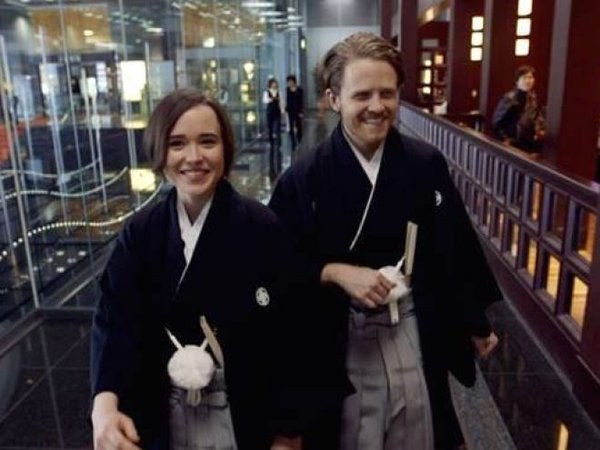In the opening moments of the trailer for her new documentary series, Gaycation, actress Ellen Page proclaims: “I’m on a journey to explore what it means to be lesbian, gay, bi, or trans all around the world.”
What follows next is two full minutes of white savior sentimentalism (white hugs, white tears) in which Ellen and “her best friend Ian,” two cisgender gay and lesbian American citizens, gallivant around a world insidiously structured for their accommodation.
Ellen and Ian’s unbridled movement across the globe is staggering to watch in the wake of vast criminalization of immigrants and refugees, unprecedented expansion of border militarization, violent capture and caging of vulnerable bodies in detention camps, and the many other brutal containment and deportation policies of national regimes.
And yet: this discrepancy is not incidental or spectacular, but reveals a much grosser geopolitical reality: access to transnational mobility by white (able)bodies relies on the detainment, delimitation, and ejection of minoritized populations.
These are also the very same populations that, unsurprisingly, have been most severely displaced by a carefully curated gay and lesbian tourism industry that has divided the world into two precarious yet politically-convenient distinctions: “gay-friendly” and “homophobic.”
It is no coincidence, then, that in a globalized economic landscape, narratives of LGBT “progress” are built on the backs of racialized others; ethnic groups positioned as both market commodities available for global capital and consumption and market surplus available for global violence and elimination.
There is nothing particularly new or surprising about white Western subjects embarking on global missions to “learn” about the cultures of Others—doing so has been central to the project of white supremacy and settler colonialism for centuries. Using the seemingly benevolent rubric of “human rights” to narrate and justify this imperial enterprise is a long-standing tradition of Empire.
What makes Ellen’s opening statement uniquely dangerous, though, is that it falsely propagates “lesbian, gay, bi or trans” as natural, biological, and existing everywhere, always.
The trailer’s next sound bite (from a white gay man) corroborates the thesis: “If you think that you live in a part of the world where there aren’t gay people, you’re wrong.”
Ellen chortles in concurrence.
Let’s be clear: If you think you live in a part of the world where eugenics-based systems of sexual classification did not supplant the expansive sexual practices and kinship arrangements of indigenous populations in the service of imperial domination, you’re wrong.
If you think you live in a part of the world where the very notion of “sexuality” is unmarked by histories of genocide, colonialism, institutionalized racism, and slavery, you’re wrong. And if you think you live in a part of the world where homophobia—the hatred of “homosexuals” (a distinct minority) by “heterosexuals” (a distinct majority)—was not originally imported and enacted through European sodomy laws, you’re wrong.
And you’re not paying attention.
At its core, Gaycation involves the perpetual restaging of an imperial fantasy that constructs (gay) tourism as an adventure into uncharted territories rife with exotic seductions. In the first episode of her “exploration,” Ellen travels to Japan where she and Ian adamantly search for “LGBT” subjects who properly narrate their lives according to a Western identity politics that privileges “coming out” (the more rainbow flags the better!) and legislative measures, namely gay marriage, as the dominant barometers of social progress.
Alternatively, subjects who do not speak sexuality, who refuse sexuality, or whose sexual practices fall outside the terms mandated by Western paradigms, are promptly dismissed and degraded.
Take, for instance, the show’s treatment of Hata and Renge, two women Ellen and Ian meet on their journey through Japan. Hata and Renge are identified as “superfans” of yaoi, or Boy’s Love (BL), a genre of Japanese anime that specifically focuses on homoerotic relationships between male characters. What Ellen and Ian find most compelling about yaoi, though, is that it’s a field of manga predominantly written by female authors for female readers.
Upon haphazardly scrolling through the pages of a yaoi text, Ellen’s voiceover chimes in: “We want to figure out why these straight women are getting so worked up reading about young gay men.”
To be clear, Hata and Renge never self-identify as “straight,” that term is externally placed on them by Ellen and Yuki Keiser, a Japanese writer who briefly accompanies the two Americans. In fact, the only term Hata and Renge use to describe themselves is fujoshi which translates to “Rotten Women.”
The name is intentionally pejorative, intended to discipline and chastise women for indulging in collective fantasies of homoerotic, non-reproductive sex. And yet, fujoshi, as a reclaimed social category, actually enables new modes of collective belonging among Japanese women; new partnerships cultivated around a shared sense of sexual difference and, even more strikingly, of political dissent.
Renge explains: “Since it’s illegal, gay love is in a sense taboo. We Rotten Women recognize that homosexuality exists and it is beautiful.” Here, the Rotten Women not only consciously position themselves as an organized movement in defiance of the state, but also a sexual subculture that offers alternative forms of love and affection.
Hata and Renge escort Ellen and Ian to a karaoke bar to listen to an audio recording of a yaoi sex scene. As sucking and thumping noises fill the space, Hata and Renge scream in pleasure—at one point exclaiming, “Isn’t it graphic? It’s a great scene.”
When Ian asks the women what they “hope to experience” by listening to BL, Hata explains: “We want to feel embarrassed listening to these boys do things. Almost as if we just happen to come across it”—Renge acts out Hata’s words, pretending to accidentally stumble upon the illicit engagement. Hata follows along, pretending to be the caught object. The two women shout “Ah!” in unison.
This moment of role-play opens up space for multiple homoerotic possibilities: sexual pleasure between men (as imagined by Hata and Renge) as well as sexual pleasure between women (as exchanged between Hata and Renge). Hata’s use of the word “we”—“we” want to feel, “we” want to do—is not a semantic incident, but a central ingredient to the women’s pleasure. Their shared intimacy and foreplay is based on a collaborative, participatory fantasy in which Hata and Renge actively pursue their desires through and with one another.
This event—women desiring men who desire men according to the sexual desire of other women—is a sexual chaos; a queer anarchy that disrupts identity politics and a colonial system of sense-making and social-ordering that Ellen, consciously or not, is deeply invested in resolving.
Indeed, the scene ends abruptly when Ellen claims: “It feels like the Rotten Women are objectifying gay sex rather than understanding the reality of being gay. So what’s it like to just live your life as a gay person in Japan? That’s what I’m interested in finding out.”
The emphatic insistence on “gay,” here, exposes the ways in which sexual vocabularies of the West are explicitly used to delegitimize and decry other forms of sexual affiliation—ephemeral or sporadic intimacies have no interest in the shallow, violent promises of state recognition.
So much is lost in Ellen’s punitive dismissal of the Rotten Women. So much is left unchallenged by the quest to uncover (and recover) a gay “reality.” And so much is illuminated about the unique brand of tunnel vision that defines the gay rights movement today. The single-minded fixation on “finding out” what you already know, what you’ve already determined is worthy of knowing.
Ellen’s journey to “explore what it means to be lesbian, gay, bi, or trans” is in fact a journey to impose what it means, then call that meaning “evidence” in order to affirm a more palatable political ordering: a global gay subject whose humanity is constituted by a recognizable sexual orientation, gender identity, nuclear family and affective investments in happiness, optimism, and love.
Alternatively, Rotten Women decolonize these normative prescriptions of gender and sexuality; troubling familiar forms of identity and community by privileging female friendship as the route to sexual pleasure rather than romantic coupling, and express that pleasure in negative feelings—embarrassment, cynicism.
Their expansive vocabularies of female desire are articulated in cooperation with empathy and solidarity against the sexual mandates of the state. For these reasons, fujoshi participate in a powerful form of queer sociality. Queer, not meaning “gay, lesbian, bi or trans.” Queer, meaning otherwise. Queer, meaning belonging-in-difference. In chaos and cacophony. Queer, meaning a horizontal political vision that frustrates a gay rights agenda by resisting conformity and instead providing an escape from global dispossession through alternative styles of pleasure, affinity, desire, and vitality.


